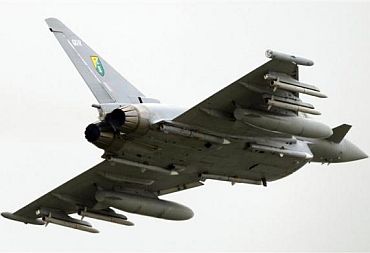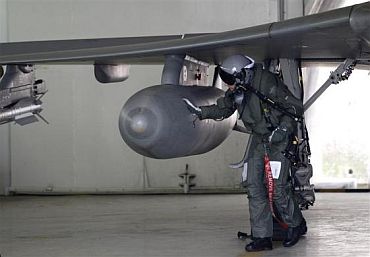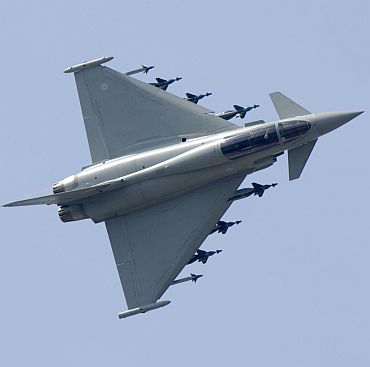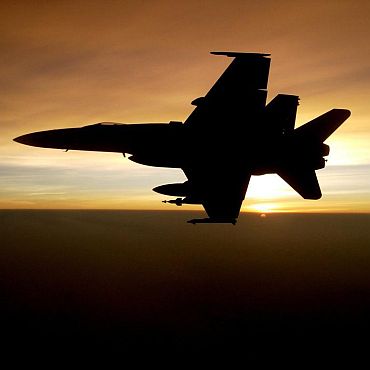 | « Back to article | Print this article |
India's fighter plane deal: All about business!
Much of the initial comment in the Indian media on the shortlisting of two of the six contenders for a Rs 42,000-crore (Rs 420 billion) fighter aircraft has focussed (predictably, perhaps) on the elimination of the two American contenders.
The United States ambassador has made some gratuitous comments: he is 'respectful' of the selection process which, he has been assured at the highest level of the government, is 'fair and transparent' (so what did he expect?).
Roemer's counterparts from Russia and Sweden, whose aircraft offers too have been rejected, have chosen wisely to hold their peace.
Click NEXT to read on . . .
India's combat aircraft deal: It's all about business
All of them must have had a good idea of what was coming; it was fairly obvious some time ago that the final choice would be between the French Rafale and the four-country Eurofighter. And so it has turned out to be.
Two newspapers in New Delhi have commented editorially that India has lost a chance to forge a stronger relationship with the US; no one here has commented on how it might have done the same with Russia, whose aircraft will be replaced by the new ones.
The Wall Street Journal though headlined its report 'India snubs US, Russia '. Snubs? As the Godfather would have said, this is not personal, it is strictly business.
Click NEXT to read on . . .
India's combat aircraft deal: It's all about business
So it might be a good idea to look beyond American disappointment (understandable) and pique (avoidable).
The important thing is that a decision on the contract for seven squadrons of multi-role combat aircraft will be made before long.
The air force is already about 10 squadrons short of its ideal strength of combat aircraft (said to be 39.5 squadrons). Indeed, of the 29 squadrons in service, the perennial problem with spares means that a good number of the aircraft in those squadrons are not airworthy.
Click NEXT to read on . . .
India's combat aircraft deal: It's all about business
Given the time line for delivery of the planes that are to be ordered, there has been speculation that another four squadrons may have to be ordered, taking the total order to 11 squadrons.
It is worth noting that the Pakistan air force has been on an expansion and upgradation drive, and has significantly reduced its longstanding force disadvantage vis-a-vis India.
Click NEXT to read on . . .
India's combat aircraft deal: It's all about business
Likewise, the Chinese air force has enhanced its capacity for air operations from the Tibetan plateau. Between the two, they now have more fighter aircraft to deploy against India than the size of the air force -- for the first time in a quarter century and more.
What is true of the air force applies to the armed forces as a whole. India's defence spending this year will be 1.8 per cent of GDP -- the lowest level since the wake-up call that the Chinese gave in 1962.
Ten years ago, the defence-GDP ratio was closer to 2.7 per cent. Unless correctives are applied, India's ratio of defence spending to GDP is in danger of slipping to the level of some European countries that face no real security threat, and which in any case have an American security umbrella available.
The problem is not just the failure to spend money, it is also the procurement process -- the invariably rocky path to ordering new ordinance.
Click NEXT to read on . . .
India's combat aircraft deal: It's all about business
The planned order for light howitzers that can be airlifted to frontline positions has just gone into another tailspin; an order for heavy-lift C-17 Globemasters is stuck because the asking price is much higher than Australia paid.
Domestic weapon development projects have made headway but most of them, including the missile programme, have also been subject to massive delays.
The end result has to be stated baldly; India's defence readiness has suffered at a time when the country's security environment has unarguably deteriorated.






